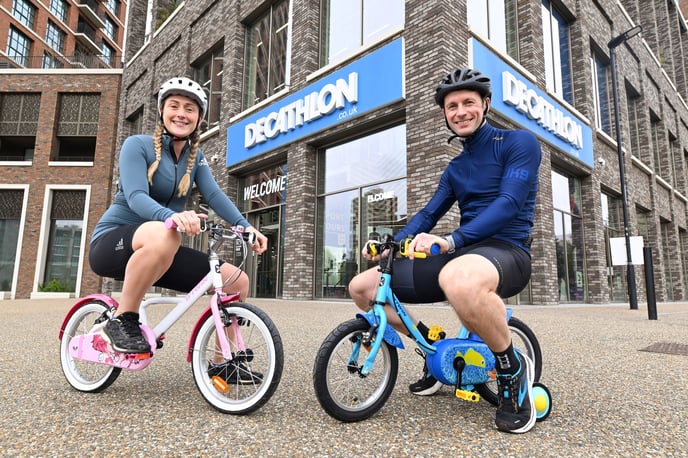
Tesco introduces digital passports for clothing items
What's going on in the world of ESG, CSRD, CSDDD, SDGs etc...
1. TESCO INTRODUCES DIGITAL PASSPORT FOR CLOTHING
Tesco is introducing digital passports for its clothing items, just ahead of new EU regulations. These passports will provide info on each product’s origins, materials, and lifecycle, helping consumers make more informed and eco-friendly choices.
This move aligns with the EU's upcoming crackdown on greenwashing, ensuring transparency and accountability in the fashion industry. This exciting development could set a new standard for how brands communicate their environmental impact.
According to The Telegraph, Tesco has applied the tool to each item in its F&F range, providing shoppers with info about the products, including where their materials were sourced. Transparency will become a competitive advantage.
2. FASB UNDER ANTI-ESG PRESSURE FROM 26 REPUBLICAN STATES
Whether we survive this climate crisis will be decided by politicians and accountants. We don’t like that answer, but that is how it is.
26 finance leaders from Republican states just wrote to the Financial Account Standards Board (FASB) to not “politicize” the Generally Accepted Accounting Procedures (GAAP) by including climate disclosures.
They say disclosures ”purport to be about financial reporting but in reality, are about commandeering the financial system to advance a substantive climate agenda … not democratically approved in the U.S.”
GAAP and IFRS (who governs ISSB) are closely intermingled, so this is very dangerous.
Be careful how you vote. Continue to educate your local politicians and business leaders.
3. INTERNATIONAL COURT OF JUSTICE ON STATES AND CLIMATE CHANGE
ICJ is to produce an opinion on "Obligations of states in respect of Climate Change".
The Advisory Opinion was requested by the UN General Assembly on 29 March 2023, following a push by global coalition of States led by the Republic of Vanuatu.
The Advisory Opinion is asked to answer:
What are the obligations of States to ensure protection of the climate system … from anthropogenic emissions of GHGs States and for present and future generations?"
What are the legal consequences … for States where they, by their acts and omissions, have caused significant harm to the climate system and other parts of the environment?”
The opinion will be non-binding, but it will give a strong indication of how the Court will interpret future climate-related questions.
4. TRUMP SAYS CLIMATE CRISIS BRINGS MORE OCEAN FRONT PROPERTY
Yes, really.
In a wide ranging (nay, rambling) fireside chat with Elon Musk on X (aka Twitter), the former President had many things to say.
Among the many times energy and climate were mentioned, Trump's quote that stood out was when Trump challenged Musk’s view on the need for an energy transition with the claim that rising sea levels would create “more ocean front property.”
DJT should reflect on the fact that as we head to +3C, and consequent rise in sea-level, some of the cities that will go underwater first are Tokyo, Mumbai, New York, Bangkok, London, Lisbon, Dubai, and Vancouver.
Bill McKibben called this “the dumbest climate conversation of all time.” Truth.
5. AT LEAST 47,000 HEAT-RELATED DEATHS IN EUROPE IN 2023
You will probably have seen this reported elsewhere, but this is pretty important.
According to a new study in 'Nature Medicine’, heat-related deaths in Europe were over 47,000 in 2023. That is shocking.
Southern European countries are most affected. Greece is way worse than the rest.
Societies are getting better at adapting to extreme heat. Adaption prevented up to 80% of mortality. If 2023 temperatures had occurred in 2002-2004, the estimated morality would be more than 85,000.
"We need to take into account that inherent limits in human physiology and societal structure are likely to set a bound to the potential for further adaptation in future.”
Be careful out there.
6. COMPANIES SPEND +43% ON REPORTS THAN ON SUSTAINABILITY ACTION
Rant and personal bias alert!
According to IBM, 5000 C-suite executives say that companies that embed sustainability in their operations see better sustainability and financial outcomes, while spending less.
However, many companies use consultants for just compliance reasons. In 73% of cases, no systems are used, so the result is an expensive report and no operational systems.
This stat from IBM is no surprise to me. Only 31% of executives say they convert the data and insights into operational improvements.
That is not excusable. Software can connect materiality assessments, reports, emissions calculations and operational change.
ESG reports do not create value. That only happens when operational change occurs.
7. CANADIAN WORKER PROGRAM BREEDING GROUND FOR SLAVERY
The UN Special Rapporteur on contemporary forms of slavery has released a report calling Canada's reliance on temporary foreign workers - particularly employed in the agriculture and care sectors - a "breeding ground for contemporary forms of slavery".
The report focuses on challenges for migrant workers, particularly those employed through Canada's Temporary Foreign Worker Program and hired on employer-specific, closed work permits which it says create a significant power imbalance in favour of employers.
Barriers to unions, lack of info access to, intimidation, fear of deportation, difficulties in accessing healthcare, substandard living conditions… were all highlighted as particular adverse impacts for migrant workers.
Shame on you Canada.
8. NATURE BENCHMARK: COMPANIES BEHIND ON BIODIVERSITY REPORTS
Companies are very weak in how they disclose info on biodiversity.
The World Benchmarking (WBA) assessed 800 companies and gave each a score out of 100 for their actions to measure and mitigate their negative impacts on nature.
Companies were scored on how they assess their impacts and dependencies on nature, and how they disclose impacts on areas important for biodiversity.
Only three companies scored over 50/100 for the overall benchmark - Kering scored 55.4, Nestle 54.1 and Unilever 52. Notably, no company scored over 50/100 on the 'Ecosystems and biodiversity' indicators, and only four scored above 40/100.
We have work to do.
9. €700M DUTCH SCHEME FOR FARMERS TO CLOSE LIVESTOCK SITES
€700m has been approved for Dutch farmers to voluntarily close livestock sites. The scheme will apply to priority areas, which include peatlands, sandy soils, stream valleys, as well as areas in and next to Natura 2000-areas.
This scheme is in addition to two previous schemes worth €1.47B which aimed to reduce excessive nitrogen from livestock sites on nature conservation areas. The scheme will run until 2029.
Reducing livestock numbers, as well as more eco-friendly livestock management, is essential to keep the food system within planetary boundaries - to reduce emissions, soil/water/air pollution, and restore biodiversity.
More of this please!
10. WIZZ AIR LAUNCHES UNLIMITED FLIGHTS SUBSCRIPTION
In what should be filed under “one of the worst ideas of all time” Wizz Air’s “all you can fly scheme” is being offered at an introductory price for a limited time.
At precisely the time when people are being asked to reduce their flights and associated CO2, Wizz’s is promoting the opposite.
The €599 annual fee covers all flights across the company’s network - 950 routes in Europe, North Africa, Middle East and Asia.
"Wizz Air's decision to launch an ‘all-you-can-fly’ subscription service in the middle of a climate crisis is like adding wood to a burning fire,” Hannah Lawrence, spokesperson for campaign group Stay Grounded. “It shows the industry has no intention of reducing their emissions and cannot be trusted.


